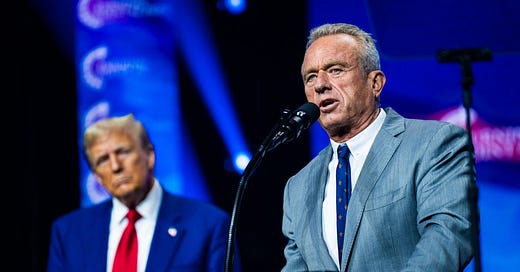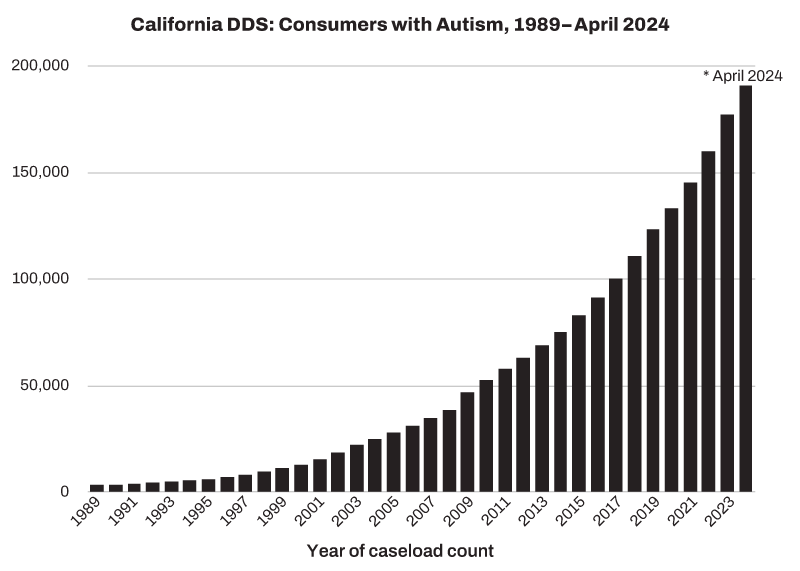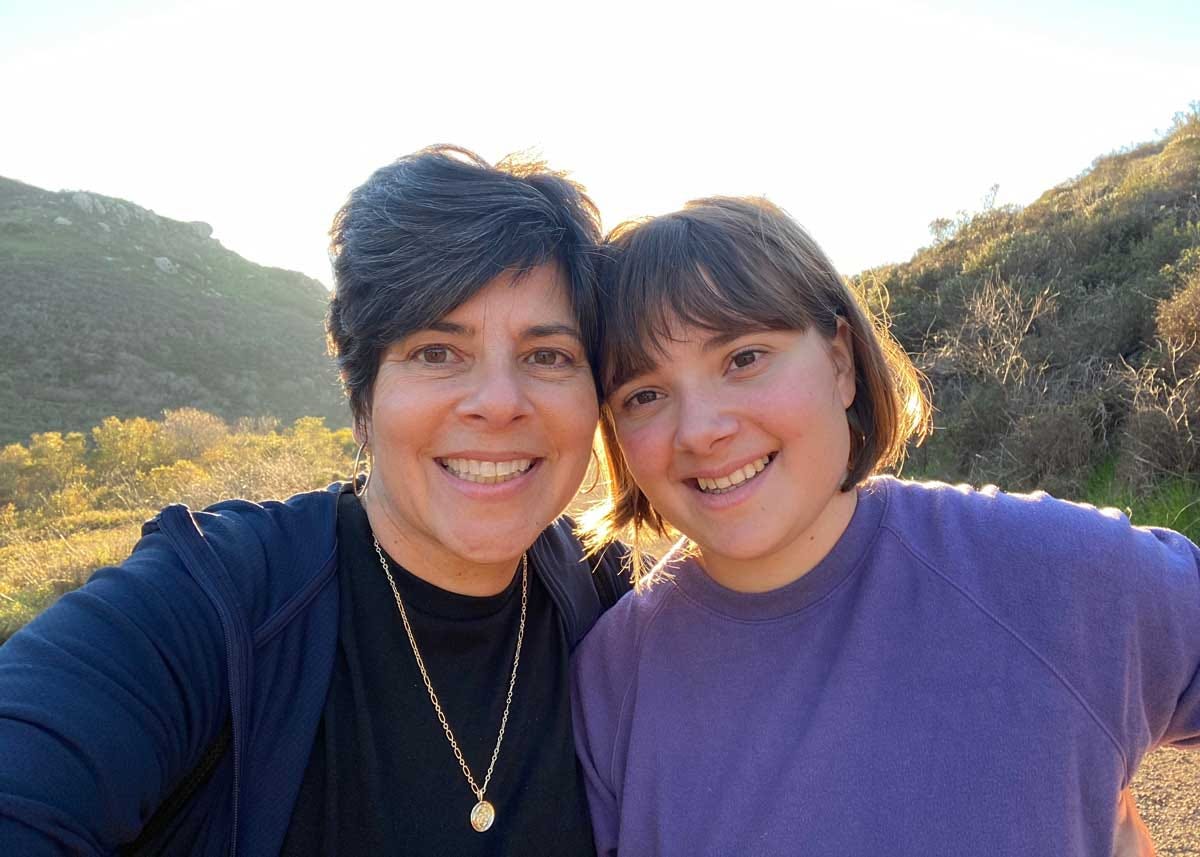
Whatever you may think of Donald Trump and Robert F. Kennedy Jr., let’s give them credit for being essentially the only politicians to invoke an alarming and shadowy topic few want to acknowledge: the crisis of America’s rising rates of autism.
And with the news that Kennedy is going to be Trump’s nominee to head the Department of Health and Human Services, there will be an opportunity for them to act upon their concern. But the peril is that, given Trump and Kennedy’s history of blaming vaccines, they might continue down this discredited path.
The once-rare diagnosis of autism now consumes the lives of ever-growing numbers of U.S. families—including mine. But autism has become so mired in controversy that wary politicians tend to look away. When comedian Dave Smith recently asked this unfunny question about Trump and Kennedy—“Why are they the only ones who are talking about this?”—his remarks on Instagram were viewed 3.7 million times.
This crisis urgently needs to be addressed, not just because children with autism and their families need research, hope, and help but because all of society is affected by a growing cohort of young adults who will require lifetime care. The numbers are astonishing and irrefutable.
An autism diagnosis was extremely rare in the 1960s to early 1980s, in the range of 0.01 to 0.05 percent of all children. Then, in the early 1990s, clinics and schools began to notice an inexplicable surge of cases. A 1996 Centers for Disease Control and Prevention surveillance conducted in response to national concerns found a prevalence of 0.42 percent of 8-year-old children in the Atlanta area. Starting in 2000, the CDC undertook rigorous multisite studies using consistent methodology. It first found that 0.67 percent of 8-year-olds had autism, followed by steady increases thereafter: 1.13 percent in 2008, 1.85 percent in 2016, and 2.76 percent in 2020.
The latest U.S. federal agency surveys now identify more than 3 percent of children ages 3 to 17 as having autism—at least a 60-fold increase from 50 years ago. And some studies report even higher rates: For example 4.6 percent of 4-year-olds in San Diego County in 2020.
No matter the magnitude of each successive increase, the media often issues the reassurance that the rise is not real, but a function of more recognition and of broader definitions of the condition. But Kennedy, who is 70 years old, made a salient observation last year in an interview: “I have never in my life seen a man my age with full-blown autism, not once. Where are these men?”
The truth is, not a single study has identified them in any appreciable numbers. For example, the California Department of Developmental Services, well-known for its robust data on the more disabling forms of autism, counts a mere 60 cases of autism in residents born in 1954—Kennedy’s birth year. Compare that to 5,163 cases identified in kids born in 2010. It’s important to note that this system has not expanded its eligibility criteria and, in fact, enacted more stringent requirements in 2003. It has seen its overall autism caseload soar from about 3,200 in 1989 to about 190,000 today.
What I appreciate about Trump and Kennedy is their public insistence that indeed there is something to see here, something real, something deserving of our utmost concern.
I know, because I have two profoundly autistic children who are now young adults. My daughter Sophie is 18 and lives with my husband and me. Our son Jonathan, 25, lives a few minutes away and is aided by us and paid staff. They cannot talk, read, write, or follow even simple directions, like how to draw a smiley face, change their clothes, prepare food, or use a television.
Autism is on a spectrum, and I accept that some highly verbal but socially awkward children who might have been called “quirky” in another era may be diagnosed as autistic today. But there also is no question that the population of substantially disabled children like mine, children whose problems could not have been overlooked by families and schools, has been surging. Even when one restricts autism to its most stringent definition, called profound autism, with IQs under 50 and minimal language, one still sees prevalence nearly doubling from 0.27 to 0.46 percent of 8-year-olds in the U.S. between just 2000 and 2016, according to a CDC study.
While RFK Jr. and Trump are right to say unraveling the causes of autism should be a public health priority for a second Trump administration, they are deeply wrong to invoke the discredited idea that childhood vaccines could be a culprit. As explained by Dr. Richard Besser, the former acting director of the CDC, the specter of reduced vaccination rates would pose an intolerable risk to public health, especially the health of children. It would also do nothing—nothing—to reduce the incidence of autism.
How do we know vaccines cannot be causing the autism increase? Let me count the ways:
We know that a hallmark of autism is dysregulation of brain development starting in the prenatal period. Childhood immunizations simply cannot explain what goes wrong during gestation.
There is not a single ingredient in vaccines that can cause childhood brain development to go awry, and no animal study shows links between vaccines and the abnormal brain development seen in autism.
There is no plausible reason vaccines could explain autism’s strong heritability (e.g., sharply increased incidence among siblings), or its strong male-to-female ratio of about 4 to 1.
The vaccine schedule cannot possibly explain the steadily accelerating rates over time.
And most importantly, every epidemiological study on the topic has confirmed zero association between vaccination status and the development of autism.
Two months ago, Trump pledged to establish a panel of experts who will work with RFK Jr. “to investigate what is causing the decades-long increase in chronic health problems and childhood diseases, including autoimmune disorders, autism, obesity, infertility, and many more.”
If this effort takes shape, they should listen to devoted and meticulous scientists like Rutgers University’s Walter Zahorodny, who can share his quarter-century of experience tracking autism’s ascendance using consistent diagnostic criteria. He observes that he has met no one in the clinical field or education system “who doubts this is a true increase.” At the same time, they must listen to experts like Dr. Paul Offit, who can dispel any lingering impulse to blame vaccines.
The Trump team would also do well to undo the complacent approach of the Biden administration. Instead of pushing for vigorous inquiry into causes and possible prevention of autism, the current administration let itself become part of an identitarian movement that celebrates autism. The federal Interagency Autism Coordinating Committee often acted as Orwellian language police, downplaying the disabling aspects of autism and the very desperate needs of families. The National Institutes of Health even proposed to remove “reducing disability” from its mission statement, expressing concerns about “ableism.”
President Joe Biden himself overrode the traditional “Autism Awareness Day” to proclaim it as “World Autism Acceptance Day,” with the Department of Health and Human Services declaring all of April as “Autism Acceptance Month.” This resulted in a stream of federal messaging romanticizing this often horrifically debilitating disorder, one that is projected to soon burden the country with $1 trillion a year in expenses.
But the last thing we need in addressing the national emergency of autism is more nonsense about vaccines or heavy metals—another RFK Jr. discredited favorite. And we certainly don’t need more duplicative federal efforts that fail to advance our understanding of autism.
Instead, the next administration should stick to facts and logic, while taking well-informed risks on neglected avenues for research. For example, I have long advocated for research on new concepts about autism’s origins. This relates to how toxic exposures impact not the fetus, but the parents’ germ cells—that is, their eggs, sperm, and precursor cells. There is vast scientific territory open for exploration here.
Let’s dive in. Let’s solve this. Let’s, yes, Make America Healthy Again. RFK Jr. and Trump are right to shine a spotlight. Three decades is far too long to go without answers.
Jill Escher is the president of the National Council on Severe Autism, and a board member of Autism Society San Francisco Bay Area. Read her piece “The Autism Surge: Lies, Conspiracies, and My Own Kids.”
To support our work, subscribe to The Free Press:






